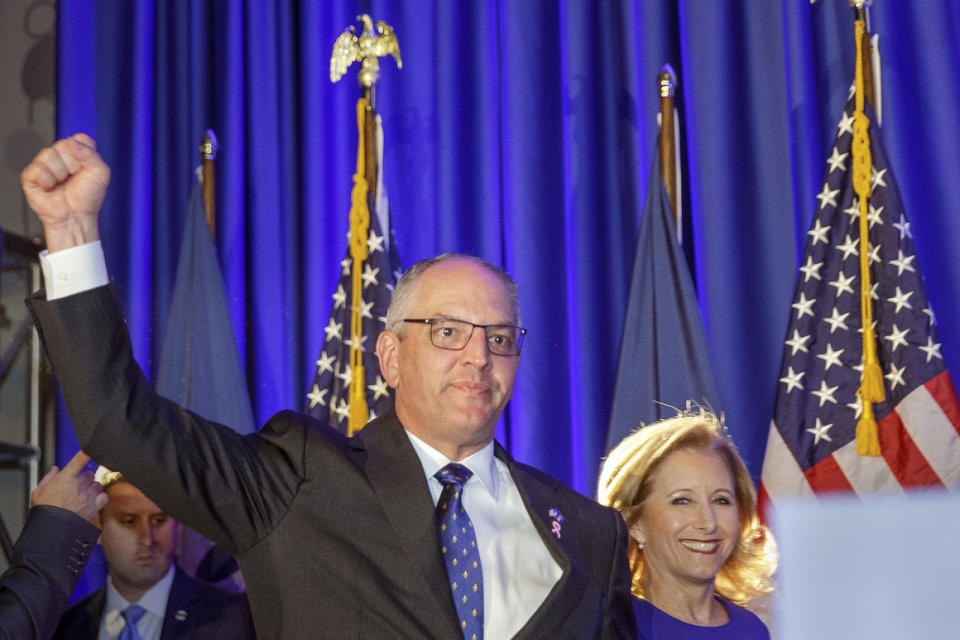RNC plunges into Louisiana gov's race amid signs of trouble
The Republican National Committee is pouring another $1 million into the Louisiana governor’s race ahead of Saturday’s runoff — a move that comes amid mounting GOP concerns about losing a second major election in a conservative state in as many weeks.
The last-minute spending doubles the committee’s investment in the race, where Republican Eddie Rispone is trying to unseat Democratic incumbent John Bel Edwards. President Donald Trump is set to headline a rally for Rispone in Louisiana on Thursday evening, barreling ahead despite worries within the GOP that Edwards is a slight favorite to win.
Trump had bet that a GOP sweep in three gubernatorial races this fall would project political strength in the face of impeachment. But after Republican Gov. Matt Bevin’s apparent defeat in Kentucky last week, and with Rispone locked in a neck-and-neck race, the president is facing the possibility of losing two out of three.
The Thursday rally will be the third time Trump has campaigned for Republicans in the gubernatorial contest. He has also recorded get-out-vote videos and robocalls, and on Friday Vice President Mike Pence is expected to call into Louisiana radio stations to make a late pitch for Rispone. It's an extraordinary level of involvement for a president whose own election is less than a year away.
The RNC has spent $2 million and deployed 60 paid staffers to try to unseat Edwards, a prime GOP target given the heavy Republican tilt of the state. The committee’s latest spending is for final get-out-the vote efforts, according to a party official. The RNC is closely aligned with the president’s political operation.
Those familiar with the investment stress the committee is confident in Rispone’s prospects and is eager to knock off an incumbent Democratic governor long seen as formidable. They say the committee — with $59 million on hand, more than six times its Democratic counterpart — can afford to spend on competitive races.
Much of the Republican consternation surrounds increased turnout among black voters during early voting, which concluded Saturday. African Americans accounted for 31 percent of early voters in the runoff, an increase from 25 percent during the first round of voting in October, in which candidates from all parties competed with the top two advancing. Democrats accounted for 46 percent of early runoff voters, up from 44 percent in the primary.
“Clearly Democrats are more energized than they were in the primary,” said John Couvillon, a Louisiana-based pollster who typically works with Republicans.
Couvillon attributed the rise in African American involvement to backlash over Trump’s outsize involvement in the contest. A desire to ensure there is a check on Republicans in the state capitol also likely played a role, he added.
“I think the odds are better for Edwards in the runoff than I thought they were on primary night,” said Couvillon, who called the early voting results “fairly bad” for Rispone.
Others, however, paint a more optimistic picture for Rispone. The increased black turnout during the early voting period only means that fewer will turn out on Election Day, some Republicans say. They also argue the state has long had a huge number of registered Democrats who typically vote Republican.
“From a macro view, it looks like the governor is performing exceedingly well in early voting,” said Lionel Rainey, a Louisiana-based Republican strategist who worked for Rispone’s primary opponent, Rep. Ralph Abraham. “But if you actually look at who the voters are, Eddie did much better than you would think. I think it’s a very tight race.”
Public polling has depicted a close contest, with recent surveys showing Edwards ahead but within the margin of error. Internal RNC data also shows Edwards on top but Rispone within striking distance, according to a person familiar with the research.

Trump, who won Louisiana by nearly 20 points in 2016, is a dominant figure in the race. Rispone, a wealthy businessman and 70-year-old first-time candidate, has aired TV commercials tying his Democratic opponent to the impeachment push as well as ads showing footage of Trump attacking Edwards.
Standing next to the president at a rally last week, Rispone lavished praise on the commander in chief and called Louisiana “Trump country.”
Edwards, a conservative Democrat who opposes abortion rights and supports gun rights, has dealt with Trump gingerly. Despite the scorching attacks, the governor insists he has a positive working relationship with the president. Earlier this year, he ran a TV spot promoting a Trump visit to Southwest Louisiana.
Trump has taken a personal interest in the race, asking aides and allies for updates and sending out a stream of texts promoting Rispone and bashing Edwards. People close to the president say he has come to view the Louisiana contest as a referendum on himself — much as he did with the races in Kentucky and Mississippi (which Republican Tate Reeves won). Trump claimed credit after Edwards failed to receive a majority of the vote in the primary, forcing a runoff.
But Trump is risking a second loss despite going all-in: He held a rally for Bevin the night before the election, only to watch him fall short. Edwards is a relatively popular incumbent, and some people in the president’s orbit are concerned that Trump has left himself exposed to criticism if Rispone loses.
Others in the Trump camp disagree, saying he’d likely be blamed for a loss whether he campaigned or not.
One of the biggest unanswered questions heading into the final stretch is the impact of this week’s impeachment hearings — specifically, whether it turns out conservative voters in the state’s rural areas who otherwise would have stayed home.
Roy Fletcher, a veteran GOP strategist in Louisiana, said the early vote totals were “really bad news for Rispone,” but added that the prospect of heavy rural turnout on Election Day gives the Republican candidate hope.
“It’s a little harder than the governor’s [path],” Fletcher said, “but it’s doable.”

